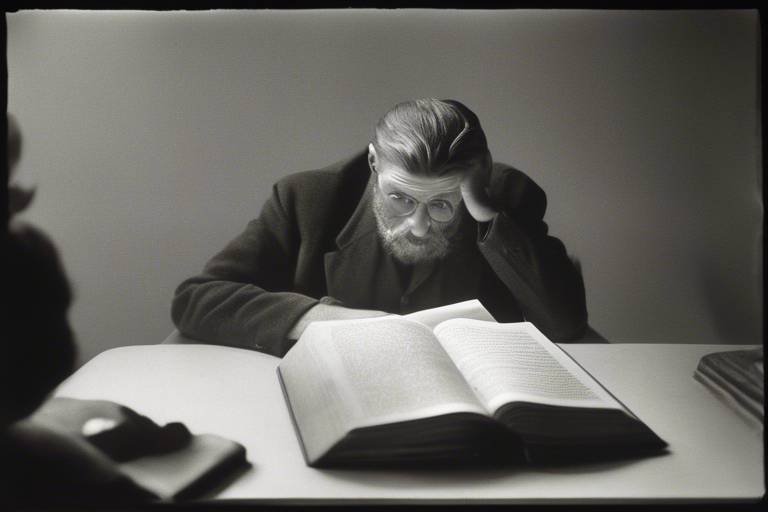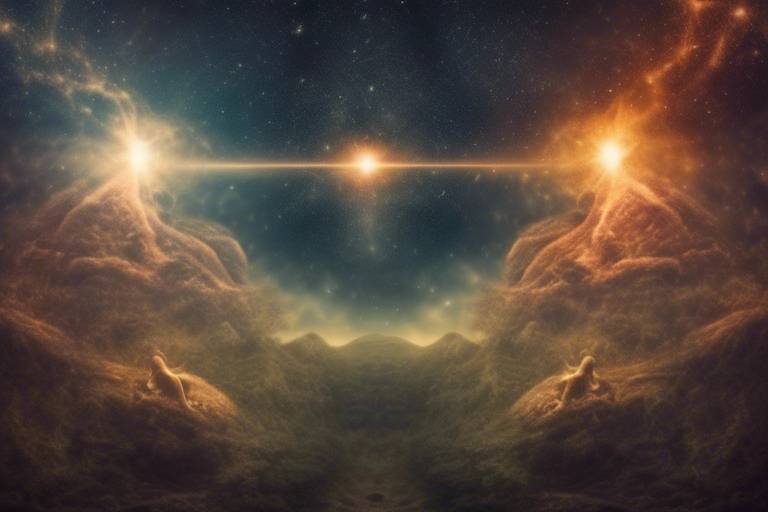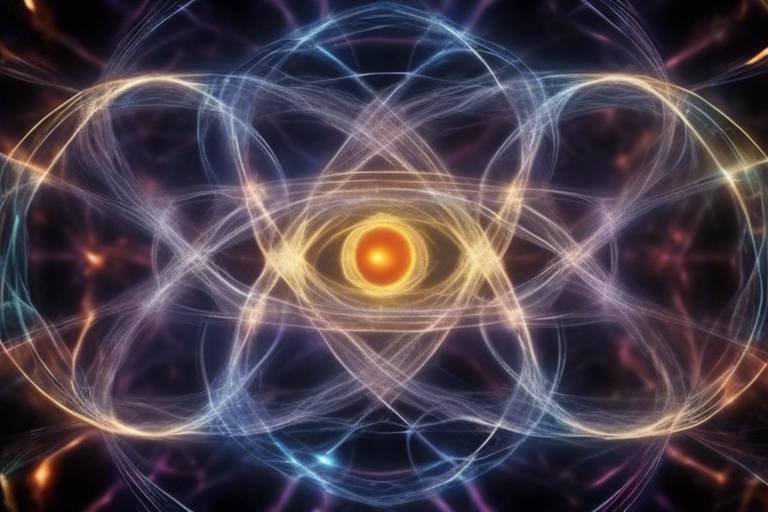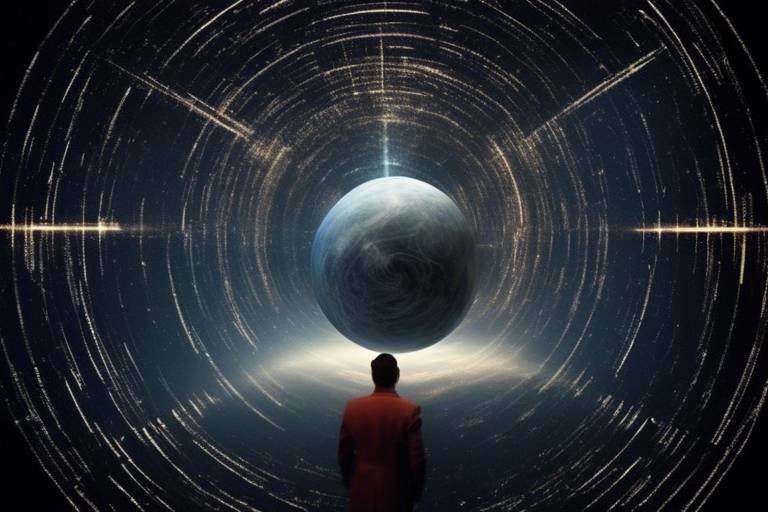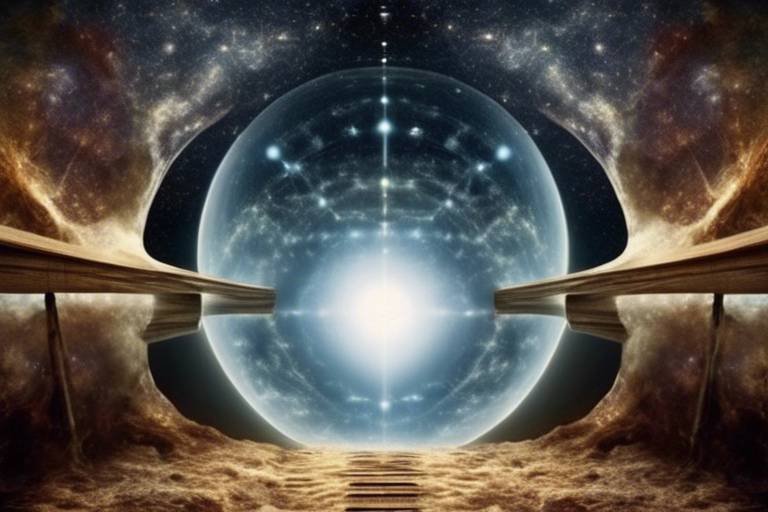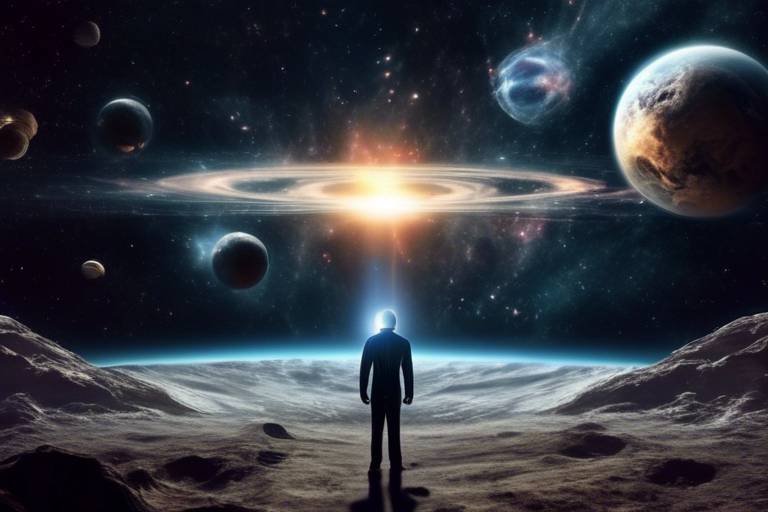Metaphysics - The Philosophy of Cause and Effect
Metaphysics is one of the most intriguing branches of philosophy, delving into the fundamental nature of reality. At its core, it seeks to answer profound questions about existence, the universe, and our place within it. Among the myriad concepts it encompasses, the principle of cause and effect stands out as a cornerstone of metaphysical inquiry. This principle isn't just a dry academic concept; it shapes our understanding of everything from everyday events to the grand workings of the cosmos. Think about it: every action has a reaction, every choice leads to a consequence, and these connections define the very fabric of our reality.
When we explore cause and effect, we’re not merely analyzing a sequence of events; we’re engaging with the essence of what it means to exist. Imagine a chain reaction: one event triggers another, creating a ripple effect that can alter the course of lives, societies, and even entire civilizations. This interplay is not only fascinating but also critical for comprehending our experiences and the universe around us. It raises questions like, "What really causes events to happen?" and "Are we merely products of our circumstances, or do we have the power to influence our outcomes?" These inquiries are at the heart of metaphysical thought.
In this article, we will embark on a journey through the landscape of metaphysics, focusing particularly on the intricate dance of cause and effect. We will delve into the historical context that has shaped these ideas, exploring the contributions of key philosophers like Aristotle, whose insights into causality laid the groundwork for much of contemporary thought. Furthermore, we will examine modern interpretations and how advancements in science, particularly in quantum mechanics, challenge traditional notions of causation. By the end of our exploration, we hope to illuminate how these ancient principles remain relevant in our understanding of both the universe and our personal lives.
The concepts of cause and effect are often taken for granted in our daily lives. We see them at play in the simplest of actions: when you drop a glass, it shatters; when you study hard, you pass your exams. But what lies beneath these straightforward examples is a complex web of implications that stretches far beyond the mundane. In metaphysics, cause and effect is not just about sequences; it’s about relationships and the underlying principles that govern them.
To grasp the significance of cause and effect, consider this: every choice we make has a ripple effect, influencing not only our lives but also the lives of those around us. This interconnectedness is what makes the study of metaphysics so compelling. It invites us to ponder the deeper questions: Are we truly in control of our destinies, or are we merely reacting to a series of predetermined events? Through this lens, we can start to see how the philosophy of cause and effect is not just a theoretical exercise but a vital part of our understanding of life itself.
Metaphysical thought has evolved significantly over the centuries, shaped by the contributions of various philosophers who have grappled with the concept of cause and effect. From ancient thinkers to modern philosophers, the discourse surrounding causation has transformed, reflecting changes in our understanding of the universe and our place within it. Key figures like Aristotle not only laid the groundwork for metaphysical inquiry but also provided frameworks that continue to influence contemporary discussions.
Aristotle's exploration of causality is pivotal in the realm of metaphysics. He proposed four types of causes that help us understand the relationship between causes and their effects. These are:
- Material Cause: What something is made of.
- Formal Cause: The form or essence of a thing.
- Efficient Cause: The agent or process that brings something into being.
- Final Cause: The purpose or goal of a thing.
Each of these causes plays a crucial role in comprehending how and why things exist as they do. By analyzing these different types of causation, we can gain a more profound understanding of the complexities of existence.
Let’s dive deeper into the first two causes: material and formal. The material cause refers to the substance that composes an object. For example, the material cause of a wooden table is the wood itself. On the other hand, the formal cause pertains to the design or essence that gives the table its identity as a table. Together, these causes help us grasp the nature of objects and their existence in the metaphysical realm.
Moving on to the efficient cause, this is about understanding who or what brought something into existence. In our table example, the carpenter who crafted the table serves as the efficient cause. Finally, the final cause provides insight into the purpose of the table—perhaps it’s meant for dining or working. This comprehensive framework offered by Aristotle not only enriches our understanding of causation but also invites us to consider the broader implications of our actions and their consequences.
As we transition into modern philosophy, the dialogue around cause and effect continues to evolve. Contemporary thinkers have reinterpreted these concepts, particularly in light of advancements in science. The rise of empirical methods and scientific inquiry has led to new understandings of causation, challenging traditional metaphysical notions. Philosophers now grapple with questions about the nature of reality and how our perceptions shape our understanding of cause and effect.
In the realm of science, the principles of cause and effect are foundational. They are essential for experimental design, hypothesis testing, and the scientific method itself. Scientists rely on these principles to establish relationships between variables, allowing them to make predictions and draw conclusions about the natural world. Whether it’s observing the effects of a drug on a disease or understanding the gravitational pull of celestial bodies, cause and effect are at the heart of scientific inquiry.
The philosophical debate between determinism and free will further complicates our understanding of causation. Determinism posits that every event is determined by preceding events, suggesting that our choices may not be as free as we believe. In contrast, the concept of free will argues that individuals can make choices independent of prior causes. This dichotomy challenges us to consider the extent of our agency and the implications of our decisions.
Adding another layer of complexity, findings in quantum mechanics have challenged traditional notions of cause and effect. At the quantum level, particles behave in ways that defy classical physics, leading to phenomena that seem to contradict our understanding of causation. This has opened new avenues for metaphysical inquiry, prompting questions about the nature of reality and the limits of human understanding.
- What is metaphysics? Metaphysics is a branch of philosophy that explores the fundamental nature of reality, including concepts such as existence, objects, and their properties.
- Why is cause and effect important? Cause and effect are crucial for understanding how events relate to one another, influencing everything from daily decisions to scientific theories.
- How did Aristotle influence metaphysics? Aristotle introduced key concepts of causation, providing a framework that continues to shape metaphysical discussions today.
- What is the debate between determinism and free will? This debate centers on whether our actions are predetermined by prior events or if we have the ability to make independent choices.
- How does quantum mechanics challenge traditional causation? Quantum mechanics reveals behaviors of particles that do not align with classical notions of cause and effect, prompting new philosophical inquiries.

Understanding Cause and Effect
When we think about the world around us, one of the first things that come to mind is the connection between actions and outcomes. This connection is what we refer to as cause and effect. It's a fundamental concept in metaphysics that not only shapes our understanding of reality but also influences our daily decisions and interactions. Imagine this: you throw a ball; the action of throwing is the cause, and the ball flying through the air is the effect. Simple, right? But the implications of this relationship go much deeper.
At its core, cause and effect is about understanding the relationship between events. It answers questions like, "Why did this happen?" or "What caused this to occur?" In metaphysical inquiry, these questions help us explore the underlying principles that govern existence. Without this framework, we would be left in a chaotic world where events occur randomly, devoid of meaning or explanation. This concept not only applies to physical actions but also to thoughts, emotions, and even abstract ideas.
In everyday life, we constantly engage with cause and effect. Consider the following examples:
- If you study hard for an exam, the likely effect is that you will perform well.
- If you neglect your health, the effect may be illness or fatigue.
- If you save money, you can afford to go on vacation, which is another effect of your initial action.
These relationships show that our actions have consequences, and understanding this can empower us to make better choices. But it’s not just about personal decisions; the implications of cause and effect extend into larger philosophical and scientific realms. For instance, in science, establishing a cause-and-effect relationship is crucial for developing theories and conducting experiments. It helps scientists predict outcomes based on certain conditions, which is foundational to the scientific method.
Moreover, the concept of cause and effect invites us to ponder deeper questions about existence itself. Is everything predetermined by prior causes, or do we have the power to change our destinies? This inquiry leads us into the heart of philosophical debates about determinism and free will, which we will explore further in the article.
In summary, understanding cause and effect is not merely an academic exercise; it's a lens through which we can view our lives and the universe. It encourages us to seek connections and meanings in our experiences, prompting us to ask why things happen and how we can influence the outcomes of our actions. As we delve deeper into the historical context and the scientific implications of these concepts, we will uncover how they shape our understanding of reality and our place within it.

The Historical Context
When we dive into the rich tapestry of metaphysical thought, it's like peeling back the layers of an ancient onion, revealing insights that have shaped our understanding of reality for centuries. The concept of cause and effect has been a cornerstone of philosophical inquiry, and its evolution can be traced through the works of several key thinkers. From the musings of ancient philosophers to the debates of modern scholars, the journey of metaphysical thought is as fascinating as it is complex.
In ancient Greece, philosophers like Plato and Aristotle laid the groundwork for metaphysical exploration. Plato's theory of forms suggested that the physical world is just a shadow of a higher reality, while Aristotle took a more pragmatic approach, emphasizing the tangible world around us. He introduced the idea that every effect has a cause, which is fundamental to understanding not just philosophy, but also science and everyday life.
As we move through history, we encounter the medieval philosophers who merged metaphysical ideas with religious doctrine. Thinkers like Thomas Aquinas sought to reconcile Aristotle's teachings with Christian theology, arguing that understanding the divine involved understanding causation. This blending of ideas was pivotal in shaping the metaphysical discourse of the time, as it highlighted the relationship between faith and reason.
The Enlightenment brought about a seismic shift in metaphysical thought. Philosophers like David Hume questioned the very nature of causation, suggesting that our understanding of cause and effect is rooted in habit and experience rather than objective reality. Hume's skepticism forced later thinkers to grapple with the implications of his ideas, leading to a deeper investigation into the nature of human perception and understanding.
In the 19th and 20th centuries, metaphysics faced challenges from emerging scientific paradigms. With the rise of empiricism and the scientific method, the emphasis shifted towards observable phenomena, leaving some traditional metaphysical questions in the dust. Yet, even amidst this shift, philosophers like Immanuel Kant sought to bridge the gap between empirical science and metaphysical inquiry, arguing that our understanding of causation is shaped by the structures of our mind.
Today, the dialogue around cause and effect continues to evolve, influenced by advancements in various fields. The interplay between metaphysics and science has never been more relevant, as contemporary philosophers grapple with the implications of quantum mechanics and the mysteries of consciousness. The historical context of metaphysical thought serves not just as a backdrop, but as a dynamic framework through which we can explore the profound questions of existence and reality.
Through this historical lens, we can appreciate how the principles of cause and effect have been dissected, debated, and redefined over time. Each philosopher has contributed to a rich dialogue that informs our current understanding, reminding us that the quest for knowledge is a continuous journey, filled with surprises and revelations.
- What is metaphysics? Metaphysics is a branch of philosophy that explores fundamental questions about existence, reality, and the nature of things.
- Who are some key philosophers in metaphysics? Key figures include Aristotle, Plato, Immanuel Kant, and David Hume, each contributing unique perspectives on cause and effect.
- How does cause and effect relate to science? In science, cause and effect are essential for forming hypotheses, conducting experiments, and understanding the natural world.
- What are some modern interpretations of cause and effect? Contemporary philosophers explore the implications of quantum mechanics and challenge traditional notions of causality.

Aristotle's Contributions
Aristotle, a towering figure in ancient philosophy, made significant contributions to our understanding of cause and effect that continue to resonate in contemporary metaphysical discussions. His exploration of causality is not merely an academic exercise; it is a lens through which we can comprehend the very fabric of reality. Aristotle proposed a framework of four distinct types of causes that offer a comprehensive view of how things come to be. These are known as the material cause, formal cause, efficient cause, and final cause. Each type of cause plays a unique role in explaining the existence and essence of objects.
The material cause refers to the substance or matter that constitutes an object. For instance, when we consider a wooden table, the wood itself is the material cause. This aspect emphasizes that without the appropriate materials, an object cannot exist. In contrast, the formal cause pertains to the form or essence of the object—essentially, what makes the table a table and not something else. This is akin to the blueprint of a building; it gives shape and structure to the materials used.
Moving on to the efficient cause, this is where things get particularly interesting. It represents the agent or force that brings something into being. In our wooden table example, the carpenter who constructs the table is the efficient cause. This highlights the importance of agency in the process of creation, reminding us that something must act to bring about change. Finally, we have the final cause, which reflects the purpose or reason for the existence of an object. Why does the table exist? To hold items, provide a surface for work, or serve as a gathering place for family and friends. Understanding this purpose enriches our perception of the object beyond mere physicality.
Aristotle's holistic approach to causation allows us to see the interconnectedness of various factors that contribute to the existence of an object. By dissecting causality into these four components, he provided a robust framework that invites us to ponder deeper questions about existence and reality. This inquiry is not just academic; it influences our daily lives as we navigate through various situations, seeking to understand the reasons behind events and actions.
In essence, Aristotle’s contributions to metaphysics are foundational. They challenge us to think critically about the nature of existence and the relationships between causes and effects. His ideas encourage a more nuanced view of reality, where every effect is not simply the result of a singular cause but rather a tapestry woven from multiple threads of causation.
- What are the four causes according to Aristotle? Aristotle identified four causes: material, formal, efficient, and final, each explaining different aspects of an object's existence.
- How do Aristotle's causes relate to modern science? While Aristotle's framework is philosophical, it lays the groundwork for understanding causation in scientific inquiry, influencing how we design experiments and interpret results.
- Can Aristotle's ideas be applied to everyday life? Absolutely! His concepts of causation help us analyze and understand the reasons behind our actions and the world around us.

Material and Formal Causes
When we dive into Aristotle's framework of causation, we encounter two pivotal concepts: material causes and formal causes. These ideas are not just philosophical jargon; they serve as the building blocks for understanding the essence of objects and their existence within the metaphysical landscape. To put it simply, a material cause refers to the substance or matter that makes up an object. Imagine a sculptor working with clay; the clay is the material cause of the sculpture. Without it, the art piece simply cannot exist. This perspective invites us to consider what things are made of, which is crucial for comprehending their nature and properties.
On the other hand, formal causes delve into the essence or the form of an object. This concept speaks to the idea of what something is, beyond its physical components. For instance, while the clay is the material cause of the sculpture, the design or shape that the sculptor envisions represents the formal cause. In this sense, formal causes give us a framework to understand the intrinsic characteristics that define an object. They answer the question: "What is it?" rather than "What is it made of?"
To illustrate these concepts further, we can create a simple comparison:
| Type of Cause | Description | Example |
|---|---|---|
| Material Cause | The substance or matter that composes an object. | Clay used in a sculpture. |
| Formal Cause | The essence or form that defines an object's nature. | The design or shape of the sculpture. |
Understanding these two types of causes helps us appreciate the complexity of existence. They remind us that objects are not merely the sum of their parts but are defined by their intrinsic properties and purposes. In our everyday lives, we often overlook these distinctions, focusing instead on the material aspects of things. However, recognizing the importance of formal causes can enhance our understanding of art, nature, and even human relationships. For example, when we consider a friendship, the material causes might be the individuals involved, but the formal cause could be the shared experiences and emotional bonds that define that relationship.
In conclusion, material and formal causes are essential to grasping the full picture of causation in Aristotle's metaphysical framework. They challenge us to look beyond the surface and appreciate the deeper meanings and structures that govern our reality. By exploring these concepts, we can enrich our understanding of the world around us and the fundamental principles that underpin our existence.

Efficient and Final Causes
When we dive into Aristotle's framework of causation, we encounter two fascinating concepts: efficient causes and final causes. These ideas not only help us understand how things come to be but also the purpose behind their existence. Let's break them down, starting with efficient causes. An efficient cause is essentially the agent or the force that brings something into existence. Think of it as the catalyst in a chemical reaction—without it, nothing would change. For example, if we consider a sculptor creating a statue, the sculptor is the efficient cause because they are the one actively shaping the marble into a form. This notion emphasizes action and agency, highlighting the importance of the initiator in the process of change.
Now, let's shift gears and talk about final causes. This concept takes us beyond mere existence and into the realm of purpose. A final cause is the end goal or the reason why something exists. Using our sculptor analogy again, the final cause of the statue might be to beautify a garden or to represent a historical figure. It’s like asking, "What’s the point?"—and that’s where final causes come into play. They push us to consider not just how something came to be, but why it matters in the grand scheme of things. This duality of efficient and final causes provides a richer understanding of the world around us, allowing us to appreciate both the mechanics of creation and the significance of purpose.
To put it simply, efficient causes are all about how something is made, while final causes are about why it exists. This distinction is crucial in various fields, from philosophy to science, as it encourages a more comprehensive exploration of existence. In fact, when we analyze events in our daily lives, we often find ourselves contemplating both the efficient and final causes. For instance, when we enjoy a delicious meal, we might think about the chef (efficient cause) and the joy of nourishment or celebration it brings (final cause).
Moreover, understanding these concepts can lead to profound insights. In modern discussions, we often see how the interplay between efficient and final causes can influence our decision-making and ethical considerations. If we recognize that our actions (efficient causes) have implications for future outcomes (final causes), we start to see the interconnectedness of our choices in a broader context. This perspective can be empowering, as it reminds us that we are not just passive observers but active participants in shaping our reality.
In conclusion, the concepts of efficient and final causes are not just philosophical musings; they are tools that can help us navigate our understanding of existence and purpose. By appreciating both the mechanics of how things come to be and the reasons behind their existence, we enrich our comprehension of life itself. So next time you ponder the world around you, remember to consider both the efficient and final causes, and you might just uncover deeper meanings in the simplest of things.
- What is the difference between efficient and final causes?
Efficient causes refer to the agent or force that brings something into existence, while final causes pertain to the purpose or reason for that existence. - How do these concepts apply to everyday life?
Understanding efficient and final causes can help us make better decisions by considering both the actions we take and the outcomes we desire. - Can efficient and final causes coexist?
Absolutely! They often work together to provide a holistic understanding of events and phenomena in both nature and human endeavors.

Modern Interpretations
As we step into the contemporary landscape of philosophy, the interpretation of cause and effect has evolved significantly. Modern thinkers are not merely echoing the ideas of their predecessors; they are challenging, expanding, and sometimes completely redefining these foundational concepts. In a world that seems increasingly governed by complexities and uncertainties, the simplistic notion of a direct cause leading to a clear effect often feels inadequate. Instead, we find ourselves grappling with a more nuanced understanding of how events unfold. For instance, consider the interplay of various factors in our daily lives—how many times have you thought, "If only I had done X differently, would Y have happened?" This reflects a more intricate web of causation than what classical metaphysics proposed.
One significant shift in modern interpretations is the integration of insights from science, particularly in the fields of physics and psychology. The advent of theories such as chaos theory and systems theory suggests that small changes in initial conditions can lead to vastly different outcomes, a concept often referred to as the "butterfly effect." This challenges the linear thinking of cause and effect, showcasing that reality is far more interconnected and unpredictable than we might have initially believed. In this light, causation becomes a complex dance rather than a straightforward path.
Moreover, the rise of quantum mechanics has further complicated our understanding of causality. In the quantum realm, particles can exist in multiple states simultaneously, and their behavior often defies classical expectations. This has led philosophers and scientists alike to ponder whether causation, as we understand it, holds true at the subatomic level. Are events predetermined, or do we have a say in the unfolding of reality? These questions are not just academic; they resonate deeply with our understanding of free will and human agency.
In addition to scientific advancements, modern philosophy has embraced a more pluralistic approach to causation. Instead of adhering to a single framework, contemporary thinkers often draw from multiple traditions, allowing for a richer tapestry of understanding. This pluralism acknowledges that different contexts may require different interpretations of cause and effect. For example, in social sciences, causation may be seen as a network of influences rather than a direct line, emphasizing the role of cultural, historical, and situational factors in shaping outcomes.
To encapsulate the essence of modern interpretations of cause and effect, we can summarize some key perspectives:
- Complexity and Interconnectedness: Modern interpretations recognize that events are often the result of multiple interrelated factors, rather than a simple cause and effect relationship.
- Quantum Uncertainty: Quantum mechanics introduces elements of randomness and uncertainty, challenging classical notions of deterministic causation.
- Pluralistic Frameworks: Embracing multiple philosophical traditions allows for a more comprehensive understanding of causation, tailored to specific contexts.
In conclusion, the modern interpretations of cause and effect invite us to reconsider our understanding of reality. Rather than viewing causation as a mere sequence of events, we are encouraged to explore the intricate, often unpredictable relationships that shape our world. As we continue to navigate the complexities of existence, these interpretations not only enrich our philosophical discourse but also enhance our ability to engage with the world around us.
1. What is the significance of cause and effect in modern philosophy?
The significance lies in its evolving interpretation, influenced by advancements in science and a deeper understanding of complexity and interconnectedness in the world.
2. How does quantum mechanics challenge traditional notions of causation?
Quantum mechanics introduces elements of randomness and uncertainty, suggesting that events may not follow a straightforward cause-and-effect relationship as once thought.
3. What role does pluralism play in understanding causation today?
Pluralism allows for multiple perspectives and frameworks to be applied to causation, acknowledging that different contexts may require different interpretations.

Cause and Effect in Science
When we step into the world of science, the concepts of cause and effect take center stage. Imagine trying to bake a cake without knowing that mixing flour and sugar causes the batter to form. In scientific terms, this relationship is not just a casual observation; it is the backbone of the scientific method. Every experiment we conduct hinges on the ability to identify what causes a change and what effects arise from that change. This intricate dance between cause and effect allows scientists to formulate hypotheses, design experiments, and draw meaningful conclusions.
At its core, the scientific method is a structured approach to inquiry that relies heavily on causation. When scientists propose a hypothesis, they are essentially making a statement about a potential cause and its expected effect. For instance, if a researcher posits that increasing sunlight will enhance plant growth, they are setting the stage for an experiment that will either confirm or refute this causal relationship. This process involves careful observation, measurement, and analysis, all of which are crucial for establishing reliable scientific knowledge.
Furthermore, the principle of cause and effect is not limited to the natural sciences; it permeates every branch of scientific inquiry. Whether you are studying biology, chemistry, physics, or psychology, understanding causation is vital. In fact, one could argue that the entire framework of scientific research is built upon a series of cause-and-effect relationships. Every discovery, every breakthrough, stems from the ability to connect the dots between what we do (the cause) and what happens as a result (the effect).
However, it's essential to recognize that causation in science is often more complex than it appears. Not all relationships are straightforward; some are influenced by multiple factors. This complexity gives rise to various models and theories that attempt to explain how different causes interact to produce effects. For example, in the field of ecology, the relationship between predators and prey is a classic example of a cause-and-effect chain, but it is also influenced by environmental factors and human activity. This intricate web of interactions can be visualized in a
| Cause | Effect | Influencing Factors |
|---|---|---|
| Increased sunlight | Enhanced plant growth | Soil quality, water availability, temperature |
| Predator population increase | Prey population decrease | Habitat destruction, climate change |
| Higher temperatures | Melting ice caps | Greenhouse gas emissions, ocean currents |
This table illustrates how a single cause can lead to multiple effects, each influenced by a variety of factors. It’s a reminder that in science, nothing exists in isolation. The interdependencies can be as intricate as a spider's web, where pulling on one strand can reverberate through the entire structure.
Moreover, the scientific community is constantly evolving its understanding of causation. As we advance in technology and methodology, new discoveries challenge our previous notions of cause and effect. Take, for instance, the field of quantum mechanics, where traditional ideas about causality are often turned on their head. Here, particles can be in multiple states at once, leading to phenomena that defy classical logic. This opens up a plethora of questions about the very nature of reality and how we perceive causation.
In conclusion, the exploration of cause and effect in science is not just an academic exercise; it is a fundamental aspect of how we understand the world around us. It shapes our knowledge, influences our decisions, and ultimately drives the progress of human understanding. As we continue to explore these relationships, we must remain open to new interpretations and challenges, for it is through this inquiry that we expand the horizons of what we know.
- What is the scientific method? The scientific method is a systematic approach to inquiry that involves making observations, forming hypotheses, conducting experiments, and drawing conclusions based on the results.
- How does cause and effect relate to experiments? In experiments, researchers manipulate one variable (the cause) to observe changes in another variable (the effect), helping them establish causal relationships.
- Can causation be established in all scientific fields? While causation is a fundamental principle in science, establishing it can be more complex in fields like psychology or ecology due to the influence of multiple variables.
- How does quantum mechanics challenge traditional views of causation? Quantum mechanics introduces concepts such as superposition and entanglement, which can lead to scenarios where traditional cause-and-effect relationships appear to break down.

Determinism vs. Free Will
The age-old debate between determinism and free will is like a thrilling tug-of-war, pulling at the very fabric of our understanding of human existence. On one side, we have determinism, which posits that every event, including human actions, is determined by preceding events in accordance with the natural laws. Imagine a grand chess game where every move is predetermined by the rules of the game and the previous moves made by the players. In this view, our choices are just pieces moving on a board, influenced by factors beyond our control.
On the other side of the ring stands free will, the idea that individuals have the power to make choices independent of any deterministic factors. This perspective is akin to a painter standing before a blank canvas, where each stroke represents a conscious decision, free from the constraints of prior events. But how do we reconcile these two seemingly opposing views? Are we merely puppets dancing on the strings of fate, or are we the authors of our own stories? This philosophical conundrum has intrigued thinkers for centuries and continues to ignite passionate discussions.
To delve deeper into this debate, let's explore how each perspective shapes our understanding of human agency:
- Determinism: This viewpoint suggests that our actions are the result of a chain of events and conditions that we did not choose. For instance, consider a person who grows up in a challenging environment; deterministic philosophy might argue that their choices are heavily influenced by their upbringing, societal pressures, and biological predispositions.
- Free Will: Advocates of free will argue that despite external influences, individuals possess the capacity to make genuine choices. Think of a musician who, despite a challenging past, chooses to pursue their passion for music. This perspective emphasizes personal responsibility and the power of choice.
One of the most fascinating aspects of this debate is how it intersects with our understanding of morality and ethics. If determinism holds true, can we hold individuals accountable for their actions? If every decision is a product of prior causes, does it diminish the significance of moral judgment? Conversely, if free will prevails, it raises questions about the nature of responsibility and the consequences of our choices. It's a philosophical labyrinth that challenges us to think critically about our beliefs and assumptions.
Furthermore, advancements in neuroscience and psychology have added layers to this discussion. Studies suggest that many decisions are made subconsciously before we even become aware of them. This raises the question: are we truly in control of our decisions, or are we simply rationalizing choices that our brains have already made? The implications of these findings can be both exhilarating and unsettling, as they challenge our intuitive sense of agency.
In conclusion, the debate between determinism and free will is not just an abstract philosophical exercise; it has profound implications for how we view ourselves and our place in the universe. Whether we lean towards determinism or free will, what remains clear is that this discourse invites us to reflect on the nature of our choices and the forces that shape our lives. So, the next time you make a decision, consider the intricate dance between fate and freedom that plays out in every moment of your existence.
Q1: What is determinism?
A1: Determinism is the philosophical belief that all events, including human actions, are determined by preceding events in accordance with natural laws. It suggests that everything is interconnected and that our choices are influenced by factors beyond our control.
Q2: What does free will mean?
A2: Free will is the concept that individuals have the ability to make choices that are not predetermined by prior events. It emphasizes personal agency and the belief that we can shape our own destinies through our decisions.
Q3: Can determinism and free will coexist?
A3: This is a contentious issue in philosophy. Some argue for compatibilism, the idea that free will and determinism can coexist, suggesting that even if our actions are determined, we can still act freely in accordance with our desires and intentions.
Q4: How do neuroscience findings impact the debate?
A4: Recent studies in neuroscience indicate that many decisions are made unconsciously before we are aware of them, challenging traditional notions of free will and suggesting that our sense of agency may be an illusion.

Quantum Mechanics and Causality
When we dive into the intriguing world of quantum mechanics, we often find ourselves questioning the very fabric of reality. Unlike classical physics, where cause and effect seem to follow a clear and predictable path, quantum mechanics introduces a level of uncertainty that can leave even the most seasoned philosophers scratching their heads. Imagine throwing a dart at a board, where instead of hitting a specific target, the dart exists in a cloud of probabilities, only settling into a position when observed. This peculiar behavior challenges our traditional notions of causality, making us rethink how we understand the universe.
At the heart of quantum mechanics lies the principle of superposition, which posits that particles can exist in multiple states at once until they are measured. This idea raises profound questions: If a particle can be in several places simultaneously, how can we pinpoint a cause for its eventual location? It’s as if the universe is playing a game of hide and seek, where the rules of causation are rewritten. This phenomenon leads us to ponder whether our understanding of causality needs an overhaul, especially when we consider the implications of quantum entanglement. When two particles become entangled, the state of one instantly influences the state of the other, regardless of the distance separating them. This instantaneous connection seems to defy the classical notion that causes must precede their effects, suggesting a deeper, more complex relationship between events in the quantum realm.
Furthermore, the Observer Effect plays a critical role in quantum mechanics. The act of observation itself alters the state of a quantum system, making it challenging to establish a clear causal relationship. This leads to the question: Is the observer a participant in the unfolding of reality, or merely a passive bystander? Some scholars argue that consciousness itself may influence the behavior of particles, adding another layer of complexity to our understanding of causality. This notion can feel like stepping into a philosophical rabbit hole, where the lines between observer and observed blur, creating a kaleidoscope of possibilities.
As we explore these quantum phenomena, we must also consider their implications on our broader metaphysical inquiries. If the classical understanding of cause and effect is insufficient in the quantum realm, what does this mean for our everyday experiences? Are we merely puppets dancing to the strings of chance, or do we still possess agency in a universe governed by probabilistic events? The answers remain elusive, but the dialogue between quantum mechanics and metaphysics is rich with potential for new insights.
To further illustrate the contrast between classical and quantum causality, consider the following table:
| Aspect | Classical Causality | Quantum Causality |
|---|---|---|
| Nature of Events | Deterministic | Probabilistic |
| Observer Role | Passive Observer | Active Participant |
| Effect Precedence | Effect follows Cause | Cause and Effect can be intertwined |
| Entanglement | Non-existent | Present and Influential |
In conclusion, quantum mechanics invites us to rethink our traditional views on causality. It opens the door to a realm where the predictable becomes unpredictable, and where the act of observation can fundamentally alter reality. As we unravel these mysteries, we find that the interplay between quantum mechanics and metaphysics is not just an academic exercise; it has profound implications for our understanding of existence itself. Are we ready to embrace the chaos and uncertainty that quantum mechanics presents? Only time—and perhaps a few more experiments—will tell.
- What is quantum mechanics? Quantum mechanics is a fundamental theory in physics that describes the physical properties of nature at the scale of atoms and subatomic particles.
- How does quantum mechanics challenge classical physics? Quantum mechanics introduces concepts such as superposition and entanglement, which defy the deterministic nature of classical physics.
- What is the Observer Effect? The Observer Effect refers to changes that the act of observation can make on a system being observed, particularly in quantum mechanics.
- Can consciousness affect quantum events? Some interpretations suggest that consciousness may play a role in the behavior of quantum systems, though this remains a topic of debate.
Frequently Asked Questions
- What is metaphysics?
Metaphysics is a branch of philosophy that explores the fundamental nature of reality, including concepts such as being, existence, and the relationship between mind and matter. It delves into questions that go beyond the physical sciences, seeking to understand the underlying principles that govern the universe.
- What is the significance of cause and effect in metaphysics?
Cause and effect are central to metaphysical inquiry as they help us understand the relationships between events and the underlying principles that govern these interactions. By examining causation, we gain insights into how different phenomena are interconnected, shaping our perception of reality.
- How did Aristotle contribute to the understanding of cause and effect?
Aristotle introduced the concept of four types of causes: material, formal, efficient, and final. Each cause provides a different perspective on why things exist and how they change, forming a comprehensive framework for understanding causation in metaphysics.
- What are the four causes defined by Aristotle?
The four causes are:
- Material Cause: The substance out of which something is made.
- Formal Cause: The form or essence of a thing.
- Efficient Cause: The agent or force that brings something into being.
- Final Cause: The purpose or end for which a thing exists.
- How do modern interpretations of cause and effect differ from classical views?
Modern interpretations often incorporate advancements in science, particularly in physics, which challenge traditional notions of causation. For instance, quantum mechanics introduces concepts of uncertainty and interdependence that complicate straightforward cause-and-effect relationships.
- What role does cause and effect play in scientific inquiry?
In science, cause and effect are crucial for formulating hypotheses, designing experiments, and interpreting results. They help scientists establish relationships between variables, allowing for predictions and a deeper understanding of natural phenomena.
- What is the debate between determinism and free will?
The debate centers around whether all events, including human actions, are determined by preceding causes (determinism) or if individuals have the capacity to choose freely (free will). This discussion has significant implications for ethics, responsibility, and the nature of human agency.
- How does quantum mechanics challenge traditional ideas of causality?
Quantum mechanics introduces phenomena such as entanglement and superposition, which suggest that particles can be interconnected in ways that defy classical notions of cause and effect. This has led to new metaphysical questions about the nature of reality and the limits of human understanding.


